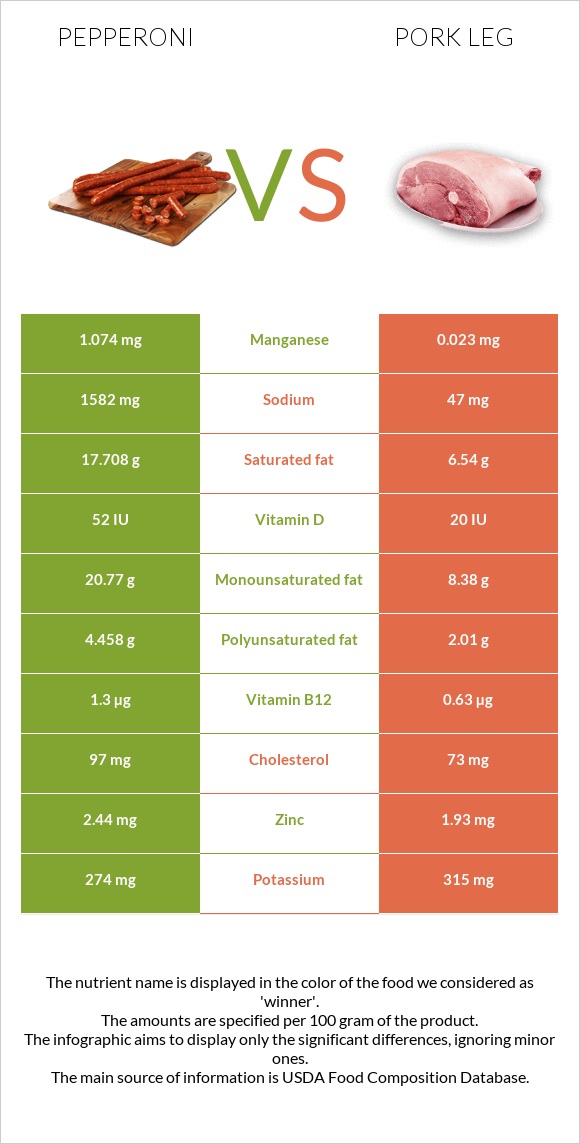Pepperoni vs. Pork leg — In-Depth Nutrition Comparison
Compare
A recap on the differences between pepperoni and pork leg
- Pepperoni is higher in manganese, vitamin B12, iron, and vitamin D, yet pork leg is higher in vitamin B1 and phosphorus.
- Pepperoni covers your daily sodium needs 67% more than pork leg.
- Pepperoni contains 47 times more manganese than pork leg. While pepperoni contains 1.074mg of manganese, pork leg contains only 0.023mg.
- The amount of sodium in pork leg is lower.
- The glycemic index of pork leg is lower.
Food varieties used in this article are Pepperoni, beef, and pork, sliced and Pork, fresh, leg (ham), whole, separable lean, and fat, raw.
Infographic

Infographic link
Mineral Comparison
Mineral comparison score is based on the number of minerals by which one or the other food is richer. The "coverage" charts below show how much of the daily needs can be covered by 300 grams of the food.
| Contains more CalciumCalcium | +280% |
| Contains more IronIron | +56.5% |
| Contains more CopperCopper | +40% |
| Contains more ZincZinc | +26.4% |
| Contains more ManganeseManganese | +4569.6% |
| Contains more MagnesiumMagnesium | +11.1% |
| Contains more PotassiumPotassium | +15% |
| Contains more PhosphorusPhosphorus | +25.9% |
| Contains less SodiumSodium | -97% |
Vitamin Comparison
Vitamin comparison score is based on the number of vitamins by which one or the other food is richer. The "coverage" charts below show how much of the daily needs can be covered by 300 grams of the food.
| Contains more Vitamin EVitamin E | +∞% |
| Contains more Vitamin DVitamin D | +160% |
| Contains more Vitamin B2Vitamin B2 | +28.5% |
| Contains more Vitamin B5Vitamin B5 | +35.8% |
| Contains more Vitamin B12Vitamin B12 | +106.3% |
| Contains more Vitamin KVitamin K | +∞% |
| Contains more Vitamin CVitamin C | +∞% |
| Contains more Vitamin B1Vitamin B1 | +171.6% |
| Contains more Vitamin B6Vitamin B6 | +10.8% |
| Contains more FolateFolate | +40% |
All nutrients comparison - raw data values
| Nutrient |  |
 |
DV% diff. |
| Sodium | 1582mg | 47mg | 67% |
| Saturated fat | 17.708g | 6.54g | 51% |
| Manganese | 1.074mg | 0.023mg | 46% |
| Fats | 46.28g | 18.87g | 42% |
| Vitamin B1 | 0.271mg | 0.736mg | 39% |
| Monounsaturated fat | 20.77g | 8.38g | 31% |
| Vitamin B12 | 1.3µg | 0.63µg | 28% |
| Polyunsaturated fat | 4.458g | 2.01g | 16% |
| Calories | 504kcal | 245kcal | 13% |
| Choline | 51.2mg | 9% | |
| Cholesterol | 97mg | 73mg | 8% |
| Vitamin E | 1.03mg | 7% | |
| Iron | 1.33mg | 0.85mg | 6% |
| Phosphorus | 158mg | 199mg | 6% |
| Zinc | 2.44mg | 1.93mg | 5% |
| Vitamin B5 | 0.93mg | 0.685mg | 5% |
| Vitamin K | 5.8µg | 5% | |
| Protein | 19.25g | 17.43g | 4% |
| Vitamin D | 52 IU | 20 IU | 4% |
| Vitamin D | 1.3µg | 0.5µg | 4% |
| Vitamin B2 | 0.257mg | 0.2mg | 4% |
| Copper | 0.091mg | 0.065mg | 3% |
| Vitamin B3 | 4.987mg | 4.574mg | 3% |
| Vitamin B6 | 0.362mg | 0.401mg | 3% |
| Vitamin C | 0mg | 0.7mg | 1% |
| Calcium | 19mg | 5mg | 1% |
| Potassium | 274mg | 315mg | 1% |
| Selenium | 29µg | 29.4µg | 1% |
| Folate | 5µg | 7µg | 1% |
| Protein per 100 calories | 3.8194444444444446g | 7.114285714285714g | N/A |
| Calories per 10 g protein | 261.8181818181818kcal | 140.56224899598394kcal | N/A |
| Net carbs | 1.18g | 0g | N/A |
| Carbs | 1.18g | 0g | 0% |
| Magnesium | 18mg | 20mg | 0% |
| Trans fat | 1.527g | N/A | |
| Tryptophan | 0.23mg | 0.208mg | 0% |
| Threonine | 0.869mg | 0.776mg | 0% |
| Isoleucine | 0.901mg | 0.787mg | 0% |
| Leucine | 1.575mg | 1.376mg | 0% |
| Lysine | 1.652mg | 1.55mg | 0% |
| Methionine | 0.511mg | 0.444mg | 0% |
| Phenylalanine | 0.778mg | 0.689mg | 0% |
| Valine | 0.987mg | 0.931mg | 0% |
| Histidine | 0.688mg | 0.659mg | 0% |
| Omega-3 - EPA | 0.004g | N/A | |
| Omega-3 - DHA | 0.004g | N/A | |
| Omega-3 - ALA | 0.164g | N/A | |
| Omega-3 - DPA | 0.02g | N/A | |
| Omega-3 - Eicosatrienoic acid | 0.018g | N/A | |
| Omega-6 - Gamma-linoleic acid | 0.002g | N/A | |
| Omega-6 - Dihomo-gamma-linoleic acid | 0.04g | N/A | |
| Omega-6 - Eicosadienoic acid | 0.136g | N/A | |
| Omega-6 - Linoleic acid | 3.605g | N/A |
Macronutrient Comparison
Macronutrient breakdown side-by-side comparison
| Contains more FatsFats | +145.3% |
| Contains more CarbsCarbs | +∞% |
| Contains more OtherOther | +285.4% |
| Contains more WaterWater | +118.8% |
~equal in
Protein
~17.43g
Fat Type Comparison
Fat type breakdown side-by-side comparison
| Contains more Mono. FatMonounsaturated fat | +147.9% |
| Contains more Poly. FatPolyunsaturated fat | +121.8% |
| Contains less Sat. FatSaturated fat | -63.1% |





